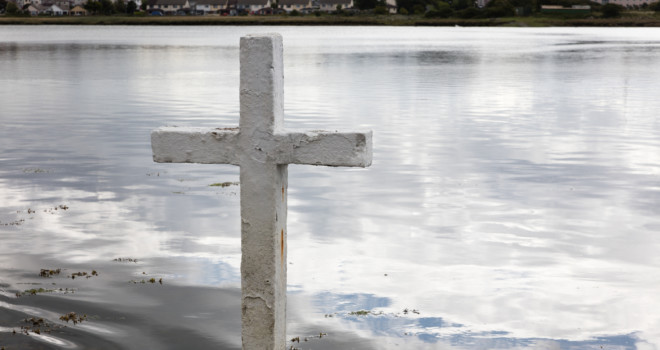O God, Thou art my God, I seek Thee, my soul thirsts for Thee; my flesh faints for Thee, as in a dry and weary land where no water is. ~Psalm 63:1
We all have periods in our spiritual lives when praying is difficult, boring, or unfulfilling; we feel as if we’re just going through the motions, we have no sense of God’s presence, and we wonder whether we’re just wasting our time. Our efforts to find God seem like a failure, and we’re certainly not aware of His running after us. It seems as if the Lord has withdrawn from us and that the religious devotions and forms of prayer that we used to find helpful or engaging are no longer so.
This experience of spiritual dryness doesn’t indicate any sort of failure on our part; it doesn’t mean we’ve offended God and caused Him to turn away from us, or that our previous religious highs were imaginary and that we’ve finally discovered the normal, unchanging reality of prayer.
No, spiritual dryness — because of our imperfect human nature and the lingering effects of Original Sin — is the almost inevitable experience of those who persevere in their efforts to grow closer to God. St. Philip Neri advises, “As a rule, people who aim at a spiritual life begin with the sweet and afterward pass on to the bitter. So now, away with all tepidity, off with that mask of yours, carry your cross, don’t leave it to carry you.”
God allows us to undergo this period of testing and growth so that we may progress in our spiritual lives. St. Paul writes, “When I was a child, I spoke like a child, I thought like a child, I reasoned like a child; when I became a man, I gave up childish ways.”109 (109 1 Cor. 13:11) His example of growing and developing as a person applies here: quite possibly the reason our previously satisfying experiences of prayer no longer appeal to us is that the Lord is calling us to a more mature faith, one requiring a deeper foundation.
This experience may be compared to moving from one community to another, which is often difficult; we have to leave behind places and experiences that we enjoyed, in exchange for a setting that’s unfamiliar and probably uncomfortable at first. This sort of move, however, might be necessary or beneficial for our career or for other important considerations, and if we give it a chance, it can prove to be a great blessing.
God often calls us in the same way. Sometimes the transition from one stage to another is uncomfortable and confusing; we can experience this process as one of spiritual dryness, but if we persevere, our efforts will be rewarded and our relationship with God will be renewed and enriched.
The saints were no strangers to spiritual dryness. We might assume that, because they were so holy and because they had completely dedicated themselves to God, they must have been constantly aware of His presence. In fact, many times this wasn’t the case; they had some of the same spiritual struggles we do. They became saints, however, by radically abandoning themselves to God’s will in an act of profound trust and by persevering in what they knew to be pleasing to Him — prayer and obedience — even though they found it difficult and lacking in all satisfaction.
This article is from a chapter in Saintly Solutions to Life’s Common Problems.
St. Ignatius of Loyola speaks of times of consolation, when prayer is easy, joyful, and satisfying, and times of desolation, when prayer is dry, uncomfortable, and unfulfilling. God gives us consolation to renew us and to reward us for our spiritual fidelity; He allows desolation to purify us from our attachments and to remind us of our utter dependence on Him.
Consolation is valuable in that it encourages us to continue our prayers and devotions, but it’s our faithfulness in times of desolation that allows us to make great spiritual progress. To pray when praying is easy is a good thing, but it doesn’t prove that we’re not just fair-weather friends to God. To pray when praying is hard greatly pleases the Lord, for it shows that our desire to know Him is deep and genuine. God knows us better than we know ourselves, and He orders all things for our benefit. St. Augustine exclaimed, “O God, You seek those who hide from You, and hide from those who seek You!” If we persevere in this spiritual hide-and-seek, we’ll be the winners.
A wonderful description of spiritual dryness, or desolation, and the proper response to it, is given in The Story of a Soul, the autobiography of St. Thérèse of Lisieux. She writes,
“I must tell you about my retreat for [religious] profession. Far from experiencing any consolation, complete aridity — desolation, almost — was my lot. Jesus was asleep in my little boat as usual. How rarely souls let Him sleep peacefully within them. Their agitation and all their requests have so tired out the Good Master that He is only too glad to enjoy the rest I offer Him. I do not suppose He will wake up until my eternal retreat, but instead of making me sad, it makes me very happy. Such an attitude of mind proves that I am far from being a saint. I should not rejoice in my aridity, but rather consider it as the result of lack of fervor and fidelity, while the fact that I often fall asleep during meditation or while making my thanksgiving should appall me. Well, I am not appalled; I bear in mind that little children are just as pleasing to their parents asleep as awake, that doctors put their patients to sleep while they perform operations, and that after all, ‘the Lord knoweth our frame. He remembereth that we are but dust.’ ”








